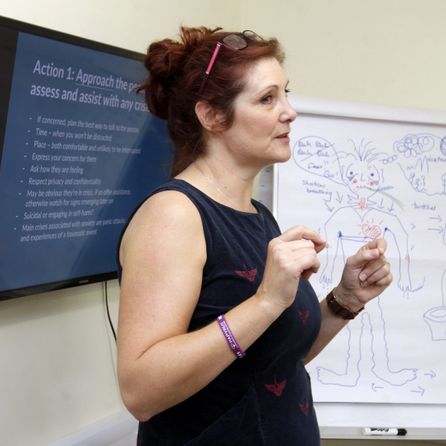Most people will tell you that suicide is a taboo subject… we just don’t talk about it, do we?
Well, as an educator in mental health and suicide awareness I can tell you the evidence points to the contrary. Of all the posts I upload on LinkedIn, the ones related to suicide receive far more interaction and comments than any other topic.
In the past ten years I’ve delivered over 300 courses to thousands of people across all sectors of work and society. In my experience, when we open up the conversation around suicide in a safe and sensitive environment people really do want to talk about it.
Although the number of people who die by suicide is statistically small in relation to the number of people who live in the UK, the ripple effect of every suicide is enormous. In a classroom of twelve people it’s rare not to have at least a couple of people who have been closely affected by it. I’m not saying that suicide is an easy topic to discuss; far from it. It touches people’s souls and releases very strong emotions. But I find that, given the opportunity, people take comfort from sharing their stories and having them witnessed and validated by others.
I also find that the suicide section in any training course is never long enough, no matter how much time is scheduled for it. Once people start to share and explore this topic it’s as if the floodgates open. People are curious about how someone can end up in a situation from which they feel there’s no other escape. They want to know how to spot the signs and how to keep their friends, themselves and their families safe.
So, why do we have this idea that people don’t want to talk about suicide? Do we shy away from talking about it for fear of upsetting others? Are we afraid what people will think? Are we afraid to open up a conversation that we feel ill-equipped to handle?… I need to be a mental health professional, don’t I? What if someone discloses something uncomfortable? What if talking about suicide will make matters worse or give someone the idea to take their life?

In reality talking about suicide does none of these things. We’re much more likely to intervene in someone’s suicide by opening up a conversation with them and showing human kindness. Talking openly about suicide gives people ‘permission’ to share their deepest distress with us. Asking about suicide shows someone you care about them and want to help.
I volunteer for the Shout, the 24/7 crisis text service. The majority of the conversations I have are with people who are contemplating suicide, who feel unable to talk to others about how they feel. If we’re brave enough to approach this subject, people are often brave enough to share their distress, in fact it’s what they’re hoping someone will do.
So, don’t ever be afraid to ask someone if they’re thinking of suicide. If they say yes, listen to them and explore what’s been happening in their life. You don’t have to have the answers, in fact most people don’t want you to ‘fix’ them. They need to feel heard and to have their emotions validated.
If you feel you’d like to gain confidence in this area attending a Suicide First Aid or a Mental Health First Aid course will give you the confidence to have a supportive conversation and know where to signpost someone for professional support.
So, let’s talk about suicide… who knows, it could save a life.










